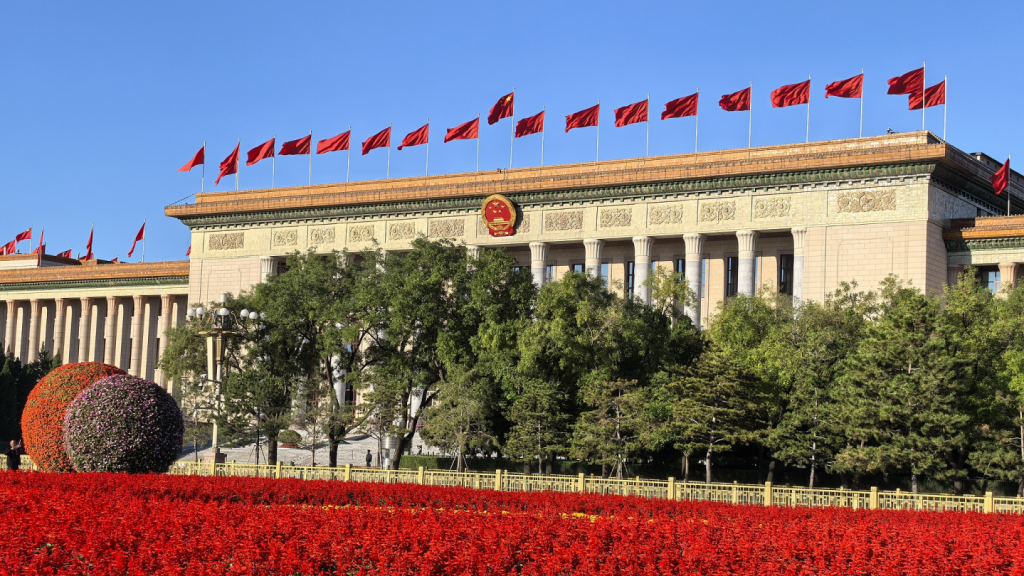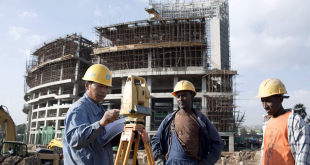Published: October 03,2024
By Xin Ge

The Great Hall of the People, Beijing, capital of China, October 1, 2024. /CFP
Ahead of China’s National Day, which falls on October 1, a grand reception was held to celebrate the 75th anniversary of the founding of the People’s Republic of China (PRC). At the reception, General Secretary of the Communist Party of China (CPC) Central Committee, Chinese President and Chairman of the Central Military Commission Xi Jinping delivered a key speech, saying that the best way to celebrate the anniversary would be to carry forward the unprecedented great cause of building China into a strong country and achieving national rejuvenation on all fronts by pursuing Chinese modernization.
Xi further emphasized that to advance Chinese modernization, it is imperative to always uphold the core role of the Party in exercising overall leadership and coordinating the efforts of all sides, unswervingly follow the path of socialism with Chinese characteristics, deepen reform across the board and expand opening up, uphold a people-centered approach, and remain committed to peaceful development.
Beyond the leadership of the CPC and the socialist path that has laid the groundwork for China’s remarkable economic rise and enduring social stability – two miracles in human history, there are two principles that hold global significance.
The first is adhering to the people-centered development approach, fundamental to China’s governing philosophy. Development serves the people, depends on the people, and its benefits are shared by the people.
During the revolutionary era, the CPC stuck to the “mass line,” fostering close ties with the populace and making wholehearted service to the people its core mission. By prioritizing the people’s interests and sharing in their hardships, the Party achieved one victory after another.
Following the establishment of the PRC, the CPC continued to champion this tradition of mass engagement, leveraging its political strength to unite the people in efforts to restore the national economy and build a socialist state. The Party has been underscoring that the economy must serve the people, and that both economic development and the improvement of livelihoods must be advanced in tandem. This approach laid a cornerstone for the development of socialism with Chinese characteristics.
Amid an increasingly complex and shifting global landscape, the Party Central Committee, led by Xi, has been stressing that “satisfying the people’s aspirations for a better life is the goal of all the Party’s work.” Prioritizing the most urgent and tangible concerns of the populace, the Party has consistently evaluated its performance by a singular standard: Whether the people feels satisfied and happy.
Poverty eradication remains a global challenge. China’s poverty alleviation campaign, grounded in its national circumstances, has adhered to a people-centered development philosophy. Through pragmatic measures, China has forged a distinctive path to poverty reduction.
In February 2021, China declared a “complete victory” in its battle against poverty, eliminating absolute poverty in a country that accounts for nearly one-fifth of the world’s population. This milestone, achieved a decade ahead of the United Nations’ 2030 Agenda for Sustainable Development, is a landmark in global poverty alleviation. Such an achievement would have been unattainable without the CPC’s unwavering commitment to the people’s well-being.
Second is the devotion to the noble cause of peace and development of humanity. Xi said in the speech that China will also vigorously advocate “peace, development, cooperation and mutual benefit, and promote world peace and tranquility and common progress of mankind.”
Over the past 75 years, China has transformed from a struggling agrarian nation into the world’s second-largest economy, the leading manufacturing powerhouse, and the holder of the largest foreign exchange reserves. Today, 1.4 billion Chinese people are forging ahead on the path to modernization, a scale that represents a formidable force driving global progress and human advancement. This historic rise in national strength is a testament to China’s contributions to global development.
Chinese President Xi Jinping addresses the general debate of the 76th session of the United Nations General Assembly via video on September 21, 2021. /Xinhua
In September 2021, at the 76th session of the United Nations General Assembly, President Xi proposed the Global Development Initiative (GDI). Over the past three years, the GDI has garnered the support and participation of more than 100 countries and international organizations, including the United Nations, with over 80 countries joining the Group of Friends of the GDI.
China has also established the Global Development and South-South Cooperation Fund, with the project pool for the GDI continuing to expand, providing strong impetus for the international community to accelerate the implementation of the UN’s 2030 Agenda for Sustainable Development.
In 2022, as global security challenges escalated, President Xi first introduced the Global Security Initiative (GSI), which articulates China’s stance on key issues such as “What kind of security concept does the world need, and how can countries achieve common security?” China has more actively contributed to global security since then, facilitating the historic reconciliation between Saudi Arabia and Iran, promoting intra-Palestinian unity, and advocating for political solutions to the Ukraine crisis.
China’s efforts extend to deepening international cooperation in areas such as counterterrorism, cybersecurity, biosecurity, artificial intelligence governance, public health and combating transnational crime – demonstrating China’s sense of responsibility as a major world power.
Furthermore, in March 2023, at the CPC in Dialogue with World Political Parties High-Level Meeting, President Xi put forward the Global Civilization Initiative (GCI) for the first time. The GCI calls for deeper exchanges and dialogues between civilizations, encouraging mutual learning to advance human progress. Through initiatives such as the Conference on Dialogue of Asian Civilizations, the CPC and World Political Parties Summit and the China-Central Asia Summit, China continues to contribute wisdom and solutions to fostering higher levels of international cooperation.
The 75-year journey of the PRC, founded on a people-centered philosophy and active participation in world peace and development, underscores the nation’s indispensable role in global progress. As China embarks on the next phase of its journey, its integration with the world will further promote the cause of human peace and development, and contribute to the building of a community with a shared future for mankind.
Xin Ge, a special commentator on current affairs for CGTN, is a research fellow at the Institute of Public Policy and Governance, Shanghai University of Finance and Economics (SUFE), and an associate professor at the School of Public Economics and Administration, SUFE.
 Africa -China Review Africa -China Cooperation and Transformation
Africa -China Review Africa -China Cooperation and Transformation
